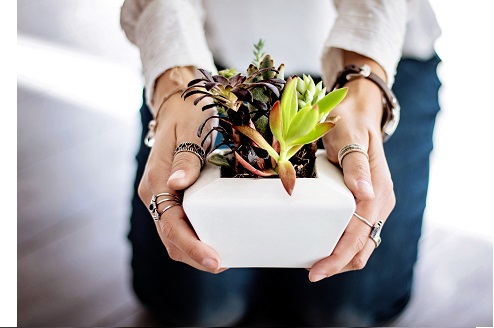When You Plant a Garden, Life Begins
July 25, 2018
 “The glory of gardening: hands in the dirt, head in the sun, heart with nature. To nurture a garden is to feed not just on the body, but the soul.”
“The glory of gardening: hands in the dirt, head in the sun, heart with nature. To nurture a garden is to feed not just on the body, but the soul.”
Alfred Austin
Spring is by far away my favorite season - a natural high. It’s nature’s way of saying “let’s party!” As the days lengthen and the sunlight starts to feel warm on the skin again, spring breathes new life into the world around us. This time of year especially I love to get outside to do some gardening; it instantly relaxes and refreshes me. I even enjoy the rainy days. I find the sounds of rain soothing - I can feel the plants flourishing as they bathe in the showers and drink up the revitalizing waters of life.
A recent meta-analysis on gardening and health published in Preventive Medicine Reports suggested that digging in the dirt is beneficial to the mind, body and soul - not just the soil. Studies show that gardening improves one’s life satisfaction, vigor, and sense of well-being. I saw a sign in a neighbor’s garden that read: “Feel free to talk to the plants; they understand.” In fact, the mental health benefits of gardening are so potent that scientists refer to it as “horticultural therapy.” What’s more, gardening is cheaper than therapy, and you get vegetables and flowers to show for your work. And whoever said money can’t buy happiness has clearly never been to a garden center nursery in spring.
“My garden is my most beautiful masterpiece.”
Claude Monet
Tending to plants in the dirt has also been shown to improve your sleep quality. In part, this is due to the outdoor exercise, which leaves you pleasantly bushed. Additionally, working in a garden melts stress away and reduces anxiety, all of which makes it easier to doze off and sleep more soundly.
Alice Sebold wrote, “I like gardening - it's a place where I find myself when I need to lose myself.” One of every three Americans actively participates in gardening, making it one of our most popular forms of exercise. Gardening is a wonderful opportunity to get intimate with nature, even if you are an urban dweller. It has been said that the best time to plant a tree was 20 years ago; the second-best time is now. I’ve planted so many trees in our yard that now the only spot that is in full sun is the center of the front yard - and Joan won’t let me plant a vegetable garden there. So I mostly plant greenery, raspberries, kale and flowers.
A study published in the Journal of Alzheimer's Disease estimated that lifelong avid gardening could cut the risk of Alzheimer’s disease by up to 50 percent. Gardening is also helpful for preventing heart disease, diabetes, and obesity. Of course, eating the nutritious homegrown plants is also therapeutic for your heart and brain, but the vegetables and fruits you grow yourself will improve your health and well-being even if they never make it to your kitchen table.
My dear friend, Linda, is passionate about her gardening and even has her own greenhouse so she can grow plants when it’s freezing cold outside. She lives in a small coastal town in northern Massachusetts on the blustery shores of the Atlantic Ocean. She wrote to me in an email, “Gardening has become a central focus of my lifestyle: the miracle of nurturing the soil, germinating the seed, the creative expression of designing the gardens, the physical satisfaction of digging and maintaining, and ultimately growing and harvesting much of my own produce.” Linda continues, “My interest in the outdoors goes way beyond gardening - I make a conscious effort to be mindful in nature. My morning walk takes me past the beaches and the salt marsh, where I listen to the natural sounds, watch the wave patterns on the water, and study the flora and fauna around me.”
Think Outside - No Box Required
Accumulating evidence indicates that spending more time outdoors is beneficial for one’s physical and mental health; reconnecting with nature reduces anxiety and depression, and improves sleep. This is especially true for children and adolescents, in whom this so-called “nature-deficit disorder” is becoming very common. Gardening boosts mood, and is an opportunity to nurture life and express creativity. Kids, in particular, have a real sense of pride and accomplishment when they see their plants thriving and eventually get to harvest juicy red tomatoes and crisp orange carrots.
In Good Health,
James O'Keefe, MD, FACC





